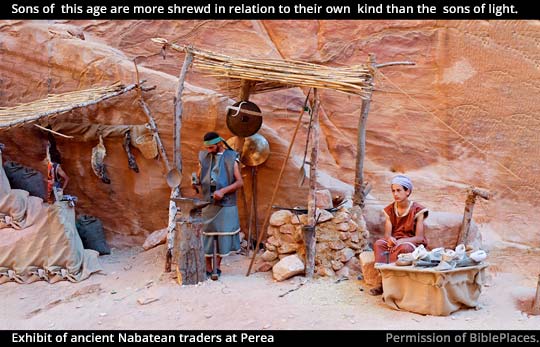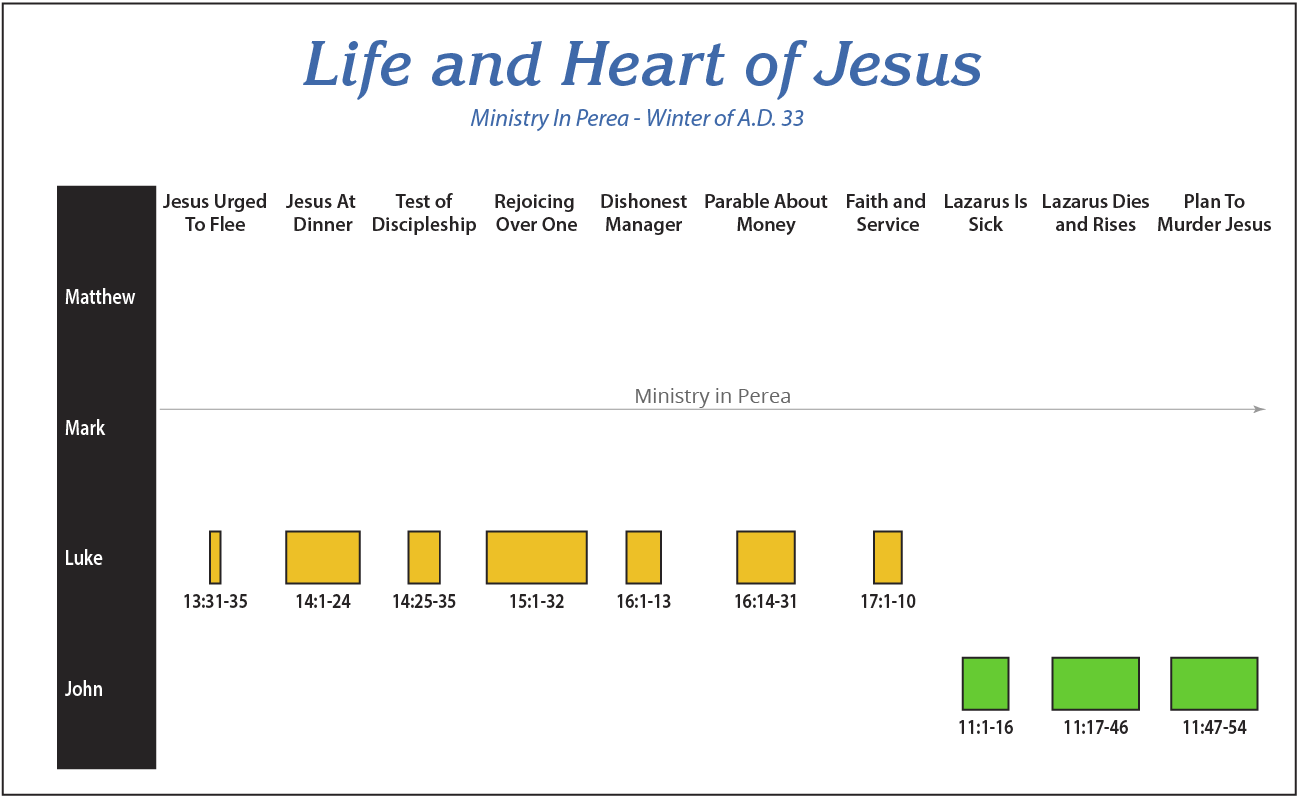
The Bible has much to say about money. Just about one-third of Jesus’ parables are about money. This study is about the parable of the unrighteous steward who was not faithful with the master’s money. Jesus will teach us how to identify a faithful manager and how to know if you are a faithful manager of the money that God has given you. There are four applications from this parable that we will explore. If you are a Christian, you will find that Jesus teaches that non-Christians are better at using money to accomplish a purpose than Christians. Then Christ will tell us how to determine if you are a faithful person. Our study comes from Luke 16:1-13.
The Formal Investigation
We do not know how much time has elapsed between Luke 15:32 and Luke 16:1.
Now He was also saying to the disciples, “There was a rich man who had a manager, and this manager was reported to him as squandering his possessions. And he called him and said to him, ‘What is this I hear about you? Give an accounting of your management, for you can no longer be manager.’” Luke 16:1-2 (NASB)
But we are left the impression that Jesus gave the parable that we are about to study soon afterwards as opposed to days or months later.
When we are told that Jesus was “saying to the disciples” it reveals a very dynamic discussion. Jesus did not just give the parable and everyone listened. The Greek tense of the word “saying” is in the imperfect. The imperfect indicates repetitive action. This means that Jesus was repeating the parable or He was involved in a long discussion. Maybe the crowd did not understand the parable at first and so He repeated parts of it. A good teacher always repeats his or her instruction (2 Peter 1:12-15). Whatever was occurring, Jesus was having a very interesting discussion with the crowd.
The parable was about a rich man and one of his managers. Maybe he had only one manager, but we do not know because Jesus does not give us enough information. We are only told that the rich man discovered the manager was squandering his wealth by a report. The Greek word that is translated as “report” is diaballo. The word refers to a formal compliant or denunciation. That is, someone told the rich man that his manager was being dishonest in some way. The rich man may have had an investigation performed and the findings revealed the manager was squandering his wealth.
Therefore, the rich man called a meeting and ask the manager to explain, “What is this I hear about you? Give an accounting of your management, for you can no longer be manager.” This rich man gives us an example that we should follow. Some people would have just fired the manger without hearing his explanation. Some people would have just sent a text, a letter, email, or posted the dismissal notice on a blog. Maybe such people want to avoid an argument or minimize a stressful situation. Quickly and coldly firing an unfaithful employee is just easier. But Jesus has told us to not receive an accusation against an individual unless we hear from him or her first. It is not enough to hear a formal accusation. We need to hear the person!
In Deuteronomy 1:17 God commands us to not be partial when judging others. Notice that we are not to preference for the insignificant or the very important person. Why? Because we are to fear God.
You shall not show partiality in judgment; you shall hear the small and the great alike. You shall not fear man, for the judgment is God’s. Deuteronomy 1:17 (NASB)
The emphasis of this statement is not on being slow to condemn a person, but on very careful to be objective and avoid a false accusation. In Deuteronomy 19:15 God also established the principle of justice. Any judgment against a person required two or three witnesses.
A single witness shall not rise up against a man on account of any iniquity or any sin which he has committed; on the evidence of two or three witnesses a matter shall be confirmed. Deuteronomy 19:15 (NASB)
The principle of multiple, honest witnesses is repeated multiple times in Scripture (Matthew 18:16; 2 Corinthians 13:2; 1 Timothy 5:19; Hebrews 10:28). In Proverbs we are warned to not be partial.
These also are sayings of the wise.
To show partiality in judgment is not good.
He who says to the wicked, “You are righteous,”
Peoples will curse him, nations will abhor him;
But to those who rebuke the wicked will be delight,
And a good blessing will come upon them. Proverbs 24:23 (NASB)
Sadly, there have always been false witnesses. Therefore, God has warned us in the Commandments and Proverbs to not be a false witness.
You shall not bear false witness against your neighbor. Exodus 20:16 (NASB)
A false witness will not go unpunished,
And he who tells lies will not escape. Proverbs 19:5.A false witness will not go unpunished,
And he who tells lies will perish.
A false witness will perish,
But the man who listens to the truth will speak forever. Proverbs 21:28 (NASB)
This is an important warning to those who distort the truth to make themselves look better while slandering another person. Nicodemus, the Pharisee who became a Christian, said this in defense of Jesus,
Do not judge according to appearance, but judge with righteous judgment. John 7:24 (NASB)
Nicodemus (he who came to Him before, being one of them) said to them, “Our Law does not judge a man unless it first hears from him and knows what he is doing, does it?” John 7:50 (NASB)
The goal is truth and protection of another’s reputation. But sadly the immoral person is unrighteous in his or her judgment and statements. They are unable and do not desire to be objective because they are unrighteous. Their thought process and attitudes are warped due to unrighteousness. Therefore, they defend the unrighteousness person and condemn the righteous person. Lady justice is not blind because she has lifted the blindfold off her eye.
But this rich man spoke directly to his manager. After the rich man and his manager had their discussion, the rich man remained firm in his decision to fire the manager.

Unrighteous Steward Was Shrewd
The next verse reveals that as the manager started thinking about his next job, as would most people. As he thought he realized that he was not strong enough dig dirt and concluded that he would be too humiliated to beg for money.
The manager said to himself, “What shall I do, since my master is taking the management away from me? I am not strong enough to dig; I am ashamed to beg.” Luke 16:3 (NASB)
Verse 4 reveals that the manager was surprised that the rich man had discovered his mismanagement and had been fired. His surprise is revealed in the manager’s statement, “I know what I shall do . . .”
I know what I shall do, so that when I am removed from the management people will welcome me into their homes. Luke 16:4 (NASB)
The Greek word for “I know” is egnon. Egnon is a difficult word to accurately translate into English. A. T. Robertson helps by giving us an explanation of the meaning of the verb tense. He says it is a . . .
. . . difficult tense to reproduce in English. I knew, I know, I have known, all miss it a bit. It is a burst of daylight to the puzzled, darkened man: I’ve got it, I see into it now, a sudden solution.[1]
This manager was completely surprised. He must have thought he was careful to hide his mismanagement. He must have thought his actions would never be discovered. Have you mismanaged someone’s money or possessions and thought you would never be discovered? If so, then just remember that God sees everything you do (1 Samuel 16:7; Proverbs 5:21; 15:3; 21:2) and He has promised that what we reap we will sow (Galatians 6:7). Our God is no fool.
The rich man’s decision created a problem for the manager. After thinking about his situation, the proud manager had a very wise plan. He would contact the rich man’s debtors and negotiated a reduction in their debt. This would please the rich man since he would finally receive a partial payment as opposed to none, and the manager would gain favor with the debtors. This would help him after he finally lost his job. Verses 3-7 describes what he did.
And he summoned each one of his master’s debtors, and he began saying to the first, “How much do you owe my master?” And he said, “A hundred measures of oil.” And he said to him, “Take your bill, and sit down quickly and write fifty.” Then he said to another, “And how much do you owe?” And he said, “A hundred measures of wheat.” He said to him, “Take your bill, and write eighty.” Luke 16:4-7 (NASB)
Thus the manager contacted two debtors. One owed the rich man one hundred measures of oil and another owed one hundred measures of wheat. The first debtor agreed to paying only half of his debt and the second only paid eighty percent. We can imagine that if these debtors were real life people they would have greatly appreciated having to pay just a fraction of the original debt. Therefore, the manager gained some friends and verse 8 states that the master was also very pleased with his manager.
And his master praised the unrighteous manager because he had acted shrewdly . . . Luke 16:8a (NASB)
This is an amazing parable because we are told that the master was very pleased with his unfaithful manager, who is described as being shrewd. The Greek word that is translated as “shrewd”, is phronimos. It has the basic sense of acting prudently or very wisely. It is an adverb describing the character of the manager. A. T. Robertson helps us understand the word with this helpful comment about the Greek word.
Perhaps “shrewdly” or “discreetly” is better here than “wisely.” The lord does not absolve the steward from guilt and he was apparently dismissed from his service. His shrewdness consisted in finding a place to go by his shrewdness. He remained the steward of unrighteousness even though his shrewdness was commended.[2]
This unrighteous and now also an unemployed manager had the outstanding characteristic of being shrewd. It is this characteristic that Jesus wants us to see. He spent the time giving us this parable so that we would understand the concept of shrewdness, because He wants believers to be shrewd too!

Be Wise Like The Sons of This Age
If you are a Christian, the last part of verse 8 must a humbling statement.
. . . for the sons of this age are more shrewd in relation to their own kind than the sons of light. Luke 16:8b (NASB)
This verse teaches that non-believers are more shrewd in regards to people who are like them than are Christians. Jesus is talking about how the unrighteous act toward others. But that is not true of the righteous.
It was a rebuke to believers to be told that the sons of this age are more shrewd than they are! Why did Jesus say this? Verse 9 explains.
And I say to you, make friends for yourselves by means of the wealth of unrighteousness, so that when it fails, they will receive you into the eternal dwellings. Luke 16:9 (NASB)
Jesus is describing the use of money. Notice that He did not say wealth is unrighteous. He was referring to the wealth that the unrighteous possess and He said that Christians are not shrewd in managing unrighteous money. Before we examine the rest of the verse, we must understand Jesus’ message so far. It is important to understand that Jesus told believers to use the “wealth of the unrighteous” rather saying “unrighteous wealth” or “the wealth of the righteous.” Why did He do that? First, because wealth is not unrighteous by itself. The use of the wealth is the issue. Second, He did not say “wealth of the righteous” because the real wealth of the righteous is not here on the earth. It is in heaven! The gospel of Matthew records Jesus’ reminders that we are not to be concerned with storing up treasure here but in heaven. Our real wealth is heaven, because that is where we will spend eternity.
Do not store up for yourselves treasures on earth, where moth and rust destroy, and where thieves break in and steal. But store up for yourselves treasures in heaven, where neither moth nor rust destroys, and where thieves do not break in or steal . . . Matthew 6:19-20 (NASB)
Therefore, Jesus rebuked the sons of light or Christians because most of us do not use our money shrewdly or prudently for eternal things. We consume the wealth God has given us on ourselves to obtain possessions and enjoy pleasure. We forget the warning that in the last days people will become lovers of pleasure (2 Timothy 3:4). Notice that Jesus does not say Christians are poor stewards in regards to earthly things. Instead, He tells us that we do not shrewdly or prudently use the wealth God has given us to make friends who will then be able to spend eternity with us. Who are these friends? People to have become Christians as the result of evangelism. That is, Christians are failing to spread the gospel about Jesus Christ. We are too consumed enjoying the wealth we have been given on ourselves! We are not good managers of God’s wealth. Christians need to use their money for evangelism and use it shrewdly so that many in heaven will welcome them when they arrive! This is the first lesson that Jesus taught using this parable.
Faithfulness In Little, Faithful In Much
The second lesson that Jesus taught is about being faithful in little things.
He who is faithful in a very little thing is faithful also in much; and he who is unrighteous in a very little thing is unrighteous also in much. Therefore if you have not been faithful in the use of unrighteous wealth, who will entrust the true riches to you? Luke 16:10-11 (NASB)
The statement “who is faithful in a very little thing is faithful also in much” is a popular statement, however, it is not understood very well. Let me illustrate. Some years ago a man asked his pastor why he was not asked to serve as an elder of the church. The man desperately wanted to be an elder. He felt insulted that he had not been asked. When the pastor explained that he had not been faithful in some initial ministries given to him, he expressed unhappiness. The man said that if he was given a major responsibility he would be very faithful and dependable. Sadly, the man did not understand Jesus’ principle that faithfulness is proven in little things or little opportunities. It would be a mistake to assume that he would be more faithful in a more significant responsibility. Jesus said, “He who is faithful in a very little thing is faithful also in much.” The man in the example above had planned to be faithful if he was given a leadership position in the church. The pastor had remembered Jesus said, “He who is unrighteous in a very little thing is unrighteous also in much.” Jesus is saying that one can expect unfaithfulness from those who are unfaithful in little things, because unfaithfulness characterizes the individual. They will continue to be unfaithful even if asked to do something even more important.
We must understand that this also applies serving the Lord in little things and the small opportunities He gives us. If a Christian is not faithful in the little ministry opportunities, we can expect that God will not give us a “big ministry.” If we are not faithful in seeking Him in the Word of God and disciplining ourselves to become like Christ, why should God allow you to be recognized as a spiritual leader for others? Yet, men and women seek an important ministry due to pride and their offended spirit further reveals their pride, which also disqualifies them. It is the sad church that permits the unqualified to lead ministries, because God’s blessing is not on that individual. He who is faithful in a very little thing is faithful also in much.

The Faithful Are Always Faithful
Jesus’ third principle is that if a person is not faithful in the care of another’s possessions, they will not be faithful the care of his or her own possessions. That is the message of verse 12.
And if you have not been faithful in the use of that which is another’s, who will give you that which is your own? Luke 16:12 (NASB)
Some people will carelessly spend another’s money because it is not their money. They are not concerned if the product is to expensive or frivolous. This is a common occurrence and it not limited to charities and philanthropy organizations. People will sacrificially give their money to meet a worthy need or cause, and then the management of the organization carelessly gives that money to their senior managers or workers. Jesus’ message is that the unfaithful person will do the same with their own money. That is, they have a character flaw. It is characteristics of the unfaithful person.
This principle is illustrated in the selection of elders. For example, in 1 Timothy 3:4-5 the qualifications of an elder require that an elder in the church must be faithful in managing his home. In that passage it is stated as, “one who manages his own household well.” He must also have the skill to manage his home well. Jesus’ third message is simple. An unfaithful man is always unfaithful. This the characteristic of the man is one of unfaithfulness in everything that he or she does.
The Faithful Serve Only The Master
The fourth and last principle is also about faithfulness.
No servant can serve two masters; for either he will hate the one and love the other, or else he will be devoted to one and despise the other. You cannot serve God and wealth. Luke 16:13 (NASB)
Notice that Jesus refers to a servant who serves. The Greek word for “serve” is oiketes, which refers to a house servant. While this house servant is not like the manager of the house in verses 3-8, Jesus is still talking about faithfulness. He is calling Christians to be faithful as a slave to Christ. It is important to note that the Greek for “serve” is douleuo, which refers to those who are being a slave for another. That is, the unfaithful will do whatever money demands and ignore the commands of Christ. Either we will be faithful to Christ or to the money!
Conclusion
Believers must be faithful to the Lord in all things. This is the ultimate test of a person’s faithfulness. Christians are to be characterized as being faithful. If an individual is not faithful in whatever God has given to them it reveals that the individual will not be faithful to the Lord either. If he or she is not faithful in giving money to the Lord, why should the Lord give him or her more money or other things?
This parable and the applications that followed are about faithfulness in general and not just money. But Jesus emphasized being shrewd in the use of money for the purpose of evangelism. Therefore, you must ask yourself, “What am I doing to help others have their sins forgiven and be destined for heaven?” Are you personally sharing Christ with others? Are you using your money to support ministries seeking to spread the good news about Jesus around the world?
Are you faithful in the use of the money that God has given as tool to serve Christ or do you always want the church to reimburse you? Do you horde your money or do you spend it to make friends who will greet you when you enter heaven? If so, then Daniel 12:3 gives you a wonderful promise.
Those who have insight will shine brightly like the brightness of the expanse of heaven, and those who lead the many to righteousness, like the stars forever and ever. Daniel 12:3 (NASB)
Notice the phrase “those who lead the many to righteousness” refers to others becoming believers in God. Those who are engaged in leading others to Christ will shine like the stars in heaven forever and ever! Will that be true of you?
References:
1. A.T. Robertson, Word Pictures in the New Testament. Baker Book House. 1930. vol. 2, p. 216.
2. Ibid., p. 217.
